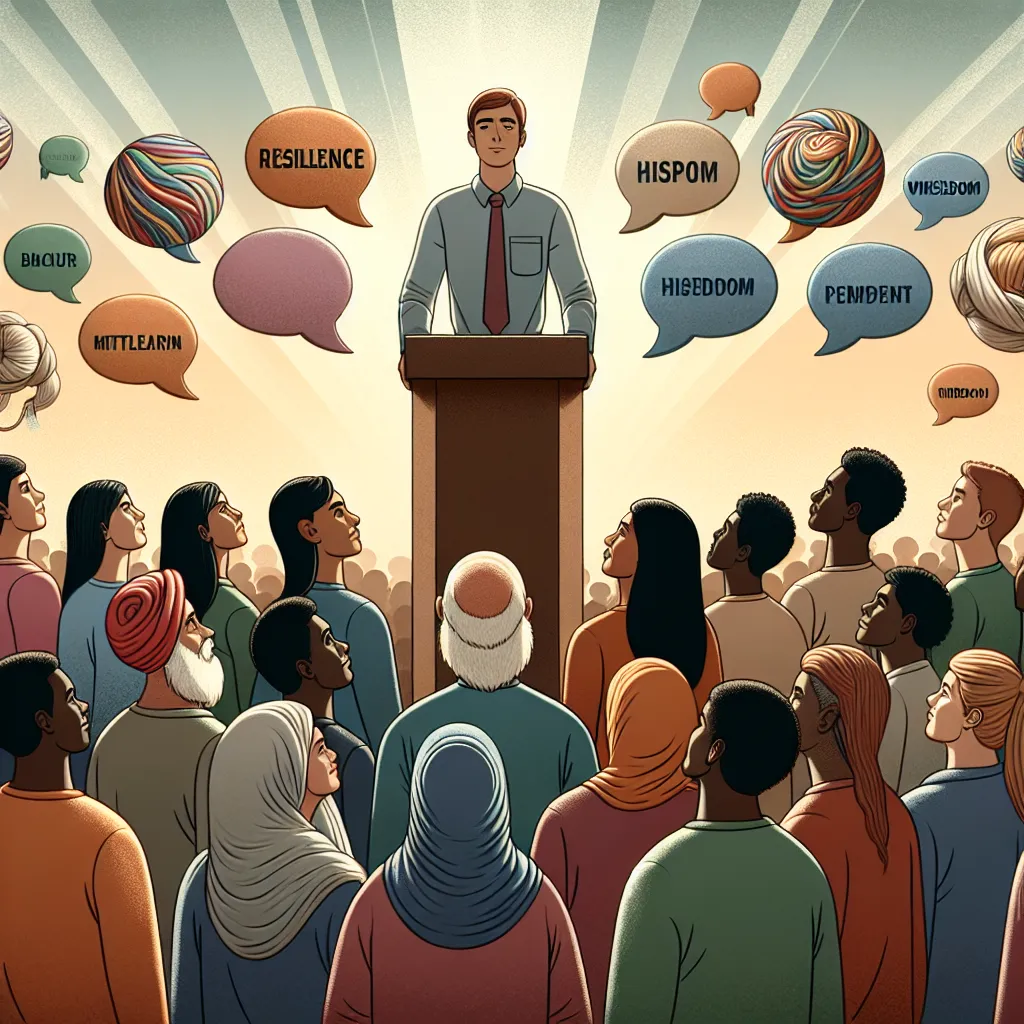As an experienced IELTS Speaking examiner, I’ve witnessed countless candidates struggle with this topic. Today, I’ll guide you through answering questions about role models, a subject that frequently appears in IELTS Speaking tests worldwide, including Vietnam, India, Australia, and Southeast Asian countries.
Nội dung bài viết
- Part 1: Introduction and Interview
- Q: Do you have any role models?
- Q: What qualities do you think make someone a good role model?
- Part 2: Long Turn
- Sample Answer (Band 8-9)
- Examiner’s Follow-up Questions
- Part 3: Two-way Discussion
- Q: How has the concept of role models changed in recent years?
- Q: Do you think the media has a responsibility in promoting positive role models?
- Key Vocabulary and Phrases for High Scores
- Examiner’s Advice
 Inspiring role model
Inspiring role model
Part 1: Introduction and Interview
In this section, the examiner may ask you general questions about role models. Here are some common questions and sample answers:
Q: Do you have any role models?
Band 6-7 Answer:
Yes, I do. My role model is my high school teacher. She was always kind and helpful to her students.
Band 8-9 Answer:
Absolutely. I’d say my primary role model is my former high school literature teacher, Ms. Nguyen. Her unwavering dedication to education and her ability to inspire even the most disinterested students have left an indelible mark on my personal and professional development.
Q: What qualities do you think make someone a good role model?
Band 6-7 Answer:
I think good role models should be honest, hardworking, and kind to others. They should also be successful in their field.
Band 8-9 Answer:
In my opinion, an exemplary role model embodies a combination of admirable qualities. Firstly, they should demonstrate integrity in their actions and decisions. Additionally, perseverance in the face of adversity is crucial. A good role model should also possess empathy and the ability to inspire others through their achievements and conduct. Lastly, I believe that continuous self-improvement is a key characteristic, as it shows a commitment to personal growth and lifelong learning.
Part 2: Long Turn
Now, let’s move on to the cue card task. Here’s a sample cue card related to our topic:
Describe a person who is a great role model for others.
You should say:
- Who this person is
- How you know about this person
- What achievements this person has made
- And explain why you think this person is a great role model
Sample Answer (Band 8-9)
I’d like to talk about Malala Yousafzai, a young Pakistani activist who has become a global icon for education and women’s rights. I first learned about Malala through international news coverage of her incredible story of resilience and advocacy.
Malala’s most notable achievement is her unwavering commitment to promoting education for girls, even in the face of extreme adversity. At the age of 15, she survived an assassination attempt by the Taliban for speaking out about girls’ right to education. This event, rather than silencing her, amplified her voice on the world stage.
In 2014, at just 17 years old, Malala became the youngest-ever Nobel Peace Prize laureate, recognizing her efforts to ensure every child’s right to education. She has also established the Malala Fund, a non-profit organization working to provide quality education to girls worldwide.
I believe Malala is an exceptional role model for several reasons. Firstly, her courage in standing up for her beliefs, even in the face of life-threatening danger, is truly inspiring. Her dedication to education not only for herself but for millions of girls around the world demonstrates her selflessness and vision for a better future.
Moreover, Malala’s ability to transform personal tragedy into a platform for positive change is remarkable. She has used her experiences to raise awareness about the importance of education and gender equality on a global scale.
Lastly, despite her fame and accolades, Malala remains humble and focused on her mission. She continues to advocate tirelessly for education and women’s rights, showing that age is no barrier to making a significant impact on the world.
In conclusion, Malala Yousafzai’s unwavering commitment to her cause, her resilience in the face of adversity, and her ability to inspire positive change make her an outstanding role model for people of all ages and backgrounds.
Examiner’s Follow-up Questions
- Do you think celebrities can be good role models?
- How can parents be better role models for their children?
Band 6-7 Answer (Question 1):
Yes, I think celebrities can be good role models. Many of them work hard to achieve success and use their fame to help others. However, some celebrities might set bad examples with their behavior.
Band 8-9 Answer (Question 1):
Celebrities can indeed be influential role models, but it’s a double-edged sword. On one hand, many celebrities use their platform and visibility to champion important causes, such as environmental protection or social justice. Their success stories can inspire perseverance and hard work in their fans. However, the intense scrutiny they face can also lead to publicized missteps, potentially setting negative examples. Ultimately, I believe that while celebrities can be positive role models, it’s crucial for individuals to critically evaluate the behaviors they choose to emulate and not blindly follow anyone solely based on their fame.
Band 6-7 Answer (Question 2):
Parents can be better role models by setting good examples. They should be honest, work hard, and treat others with respect. It’s also important for parents to spend time with their children and teach them good values.
Band 8-9 Answer (Question 2):
Parents can enhance their role model status through several conscious efforts. Firstly, consistently demonstrating integrity in their actions and decisions is crucial, as children often emulate observed behaviors. Parents should also openly acknowledge their mistakes and show how to learn from them, fostering a growth mindset. Actively engaging in continuous learning and personal development sets an example of lifelong education. Moreover, expressing empathy and engaging in community service can instill important values. Lastly, maintaining open, honest communication and creating a supportive environment where children feel comfortable discussing their thoughts and concerns can significantly strengthen the parent-child relationship and amplify the parent’s influence as a role model.
Part 3: Two-way Discussion
In this section, the examiner will ask more abstract questions related to role models. Here are some potential questions and sample answers:
Q: How has the concept of role models changed in recent years?
Band 6-7 Answer:
I think the concept of role models has changed a lot. In the past, people usually looked up to famous politicians or scientists. Now, with social media, many young people see influencers as role models. This can be good or bad, depending on what these influencers promote.
Band 8-9 Answer:
The concept of role models has undergone a significant transformation in recent years, largely due to the advent of social media and the changing landscape of information dissemination. Traditionally, role models were often public figures such as politicians, scientists, or athletes, whose achievements were widely recognized but whose personal lives remained relatively private.
However, the digital age has democratized influence, allowing individuals from diverse backgrounds to gain substantial followings based on their content creation, personal branding, or niche expertise. This shift has led to the rise of micro-influencers and content creators as modern-day role models, particularly among younger generations.
This change brings both opportunities and challenges. On one hand, it has amplified diverse voices and made role models more accessible, allowing people to find inspiration in figures who more closely resemble their own experiences or aspirations. On the other hand, the curated nature of social media can create unrealistic expectations or promote superficial values.
Moreover, the increased scrutiny facilitated by social media has led to a more nuanced understanding of public figures. People are now more likely to appreciate the complexity of human nature, recognizing that even admirable individuals can have flaws. This has fostered a more realistic approach to role models, where people may emulate specific qualities rather than idealizing an entire persona.
In conclusion, while the core essence of role models as sources of inspiration remains, the way we identify, interact with, and perceive role models has become more dynamic, diverse, and critically evaluated in recent years.
Q: Do you think the media has a responsibility in promoting positive role models?
Band 6-7 Answer:
Yes, I think the media has a big responsibility. They should show more positive stories about people doing good things. This can inspire others to be better. However, the media often focuses on negative news or scandals, which isn’t helpful.
Band 8-9 Answer:
The media undoubtedly plays a pivotal role in shaping public perception and influencing societal values, and with this influence comes a significant responsibility in promoting positive role models.
Firstly, the media has the power to amplify stories of individuals who are making positive contributions to society. By highlighting the achievements and admirable qualities of these individuals, the media can inspire others and provide tangible examples of how one can make a difference in the world.
Moreover, the media has the ability to provide context and depth to the stories of role models. Rather than simply focusing on surface-level success, responsible media coverage can delve into the challenges these individuals have overcome, their motivations, and the impact of their actions. This nuanced portrayal can offer more relatable and realistic role models.
However, it’s important to note that the media’s responsibility extends beyond just promoting positive figures. They should also engage in critical analysis and maintain journalistic integrity. This means not shying away from reporting on the flaws or mistakes of public figures, as this can provide valuable lessons and promote a more realistic understanding of human nature.
Furthermore, the media has a responsibility to diversify representation in their coverage of role models. By showcasing individuals from various backgrounds, professions, and walks of life, they can ensure that a wide range of people can find relatable and inspiring figures.
In conclusion, while the media shouldn’t be solely responsible for creating role models, they do have a significant obligation to use their platform responsibly. By balancing positive storytelling with critical journalism and diverse representation, the media can play a crucial role in promoting positive role models and, by extension, contributing to the betterment of society.
Key Vocabulary and Phrases for High Scores
To elevate your responses and aim for those higher band scores, incorporate these sophisticated vocabulary items and phrases:
-
Unwavering commitment /ʌnˈweɪvərɪŋ kəˈmɪtmənt/ (noun phrase): Steady and determined dedication to a cause or goal.
Example: Her unwavering commitment to environmental conservation has inspired many to join the cause. -
Embody /ɪmˈbɒdi/ (verb): To represent or express an idea, quality, or feeling in a clear and obvious way.
Example: The scientist’s work embodies the principles of rigorous research and ethical innovation. -
Indelible mark /ɪnˈdelɪbl mɑːk/ (noun phrase): A lasting impression or effect that cannot be removed or forgotten.
Example: The professor’s mentorship left an indelible mark on her students’ academic careers. -
Amplify /ˈæmplɪfaɪ/ (verb): To increase the strength or amount of something, especially sound or emotion.
Example: Social media can amplify both positive and negative messages rapidly. -
Resilience /rɪˈzɪliəns/ (noun): The capacity to recover quickly from difficulties; toughness.
Example: The community’s resilience in the face of natural disasters was truly admirable. -
Perseverance /ˌpɜːsɪˈvɪərəns/ (noun): Continued effort to do or achieve something despite difficulties, failure, or opposition.
Example: His perseverance in pursuing his dreams despite numerous setbacks is inspiring.
Examiner’s Advice
To excel in the IELTS Speaking test, particularly when discussing role models:
-
Prepare diverse examples: Have a range of role models from different fields (e.g., science, arts, activism) to discuss.
-
Practice articulating reasons: Be ready to explain why someone is a role model, focusing on specific qualities and actions.
-
Use personal anecdotes: Relate the impact of role models to your own experiences for a more engaging response.
-
Develop critical thinking: Practice discussing both positive and potentially negative aspects of role models to demonstrate balanced thinking.
-
Expand your vocabulary: Incorporate sophisticated terms related to character traits and achievements.
-
Stay informed: Keep up with current events to discuss contemporary role models and societal changes.
Remember, authenticity is key. While using advanced vocabulary is important, ensure your responses remain natural and true to your own thoughts and experiences.
For more tips on improving your IELTS Speaking skills, check out our guide on describing a famous person who is a role model for young people. You might also find our article on describing a person you admire for their hard work helpful in expanding your vocabulary and ideas for this topic.


